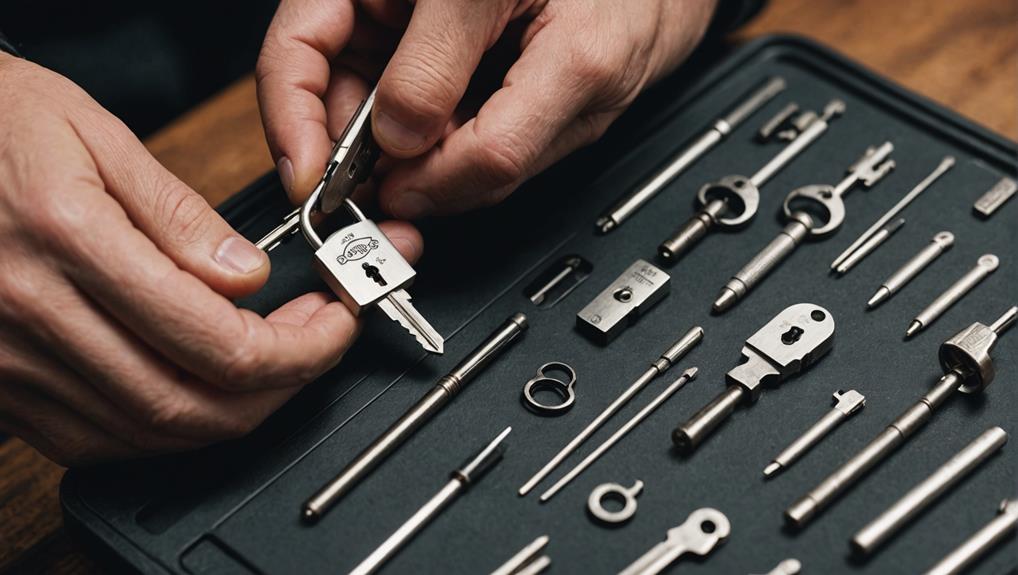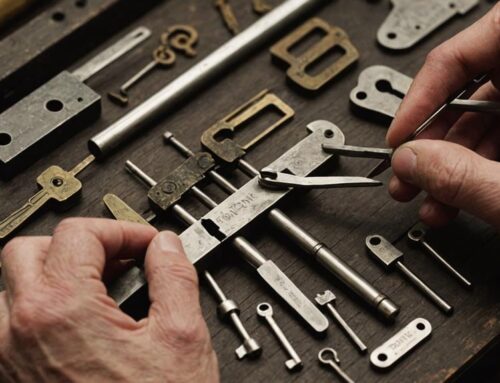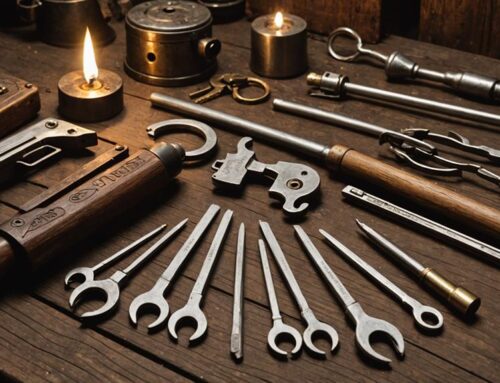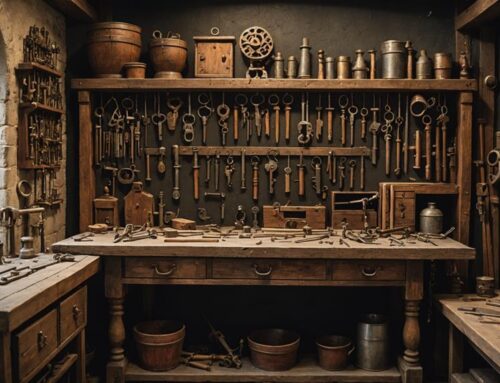To dominate lock picking competitions, you must master essential skills – using lock picks and tension wrenches. Understand different lock types such as pin tumbler and disc detainer locks. Develop speed and precision through consistent practice. Make certain you utilize specialized tools effectively – pick the right ones for the job. Practice under pressure – simulate competition environments. Remember, mastering basic skills, understanding lock types, developing speed, and practicing well are key techniques.
Key Takeaways
- Master basic techniques with feedback and tension.
- Practice different lock types for versatility.
- Develop speed and precision through regular training.
- Utilize specialized tools effectively for improved performance.
- Simulate competition pressure for confidence building.
Mastering Basic Lock Picking Skills
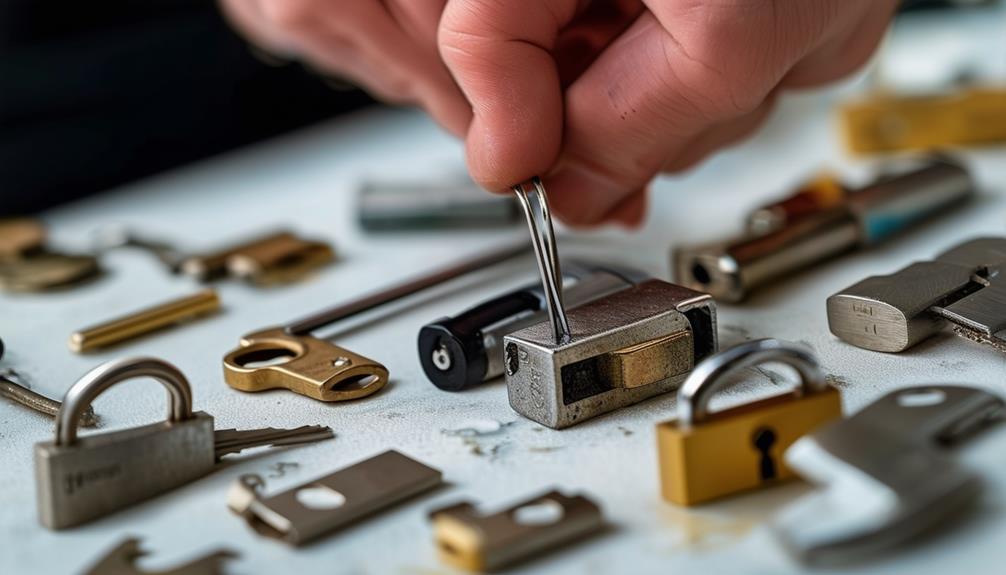
When starting on the path to winning lock picking competitions, mastering basic lock picking skills is essential. In this competition lock picking guide, the key to success lies in honing your techniques to perfection.
To begin, familiarize yourself with the tools of the trade – lock picks and tension wrenches. Understanding the fundamentals of lock picking emphasizes the importance of knowing how different types of locks function.
Practice on various locks to develop a feel for feedback and tension, key elements in successful lock picking.
As you explore deeper into the world of competitive lock picking, remember that patience and persistence are your greatest allies. Start with simple pin tumbler locks and gradually progress to more complex mechanisms.
Pay close attention to feedback from the lock as you apply tension and carefully manipulate the pins. Developing a keen sense of touch and finesse will set you apart from the competition.
With dedication and practice, mastering basic lock picking skills will pave the way to victory in lock picking competitions.
Understanding Different Lock Types

To further enhance your lock picking skills and increase your chances of success in competitions, it's essential to explore the domain of understanding different lock types.
When participating in lock picking contests, having knowledge of various lock designs can give you a significant advantage. Different locks, such as pin tumbler locks, wafer locks, disc detainer locks, and dimple locks, require specific lockpicking techniques.
Mastering advanced techniques for these locks will help you adapt quickly during competitions. For pin tumbler locks, mastering the skill of applying varying pressure to the pins is vital.
Understanding how wafer locks operate and using a rake tool effectively are essential lock picking contest strategies. Disc detainer locks demand precision and control to manipulate the discs inside.
Dimple locks, on the other hand, require specialized tools and techniques to navigate the unique keyway. By familiarizing yourself with these different lock types and the corresponding lock picking methods, you can refine your skills and approach competitions with confidence.
Developing Speed and Precision
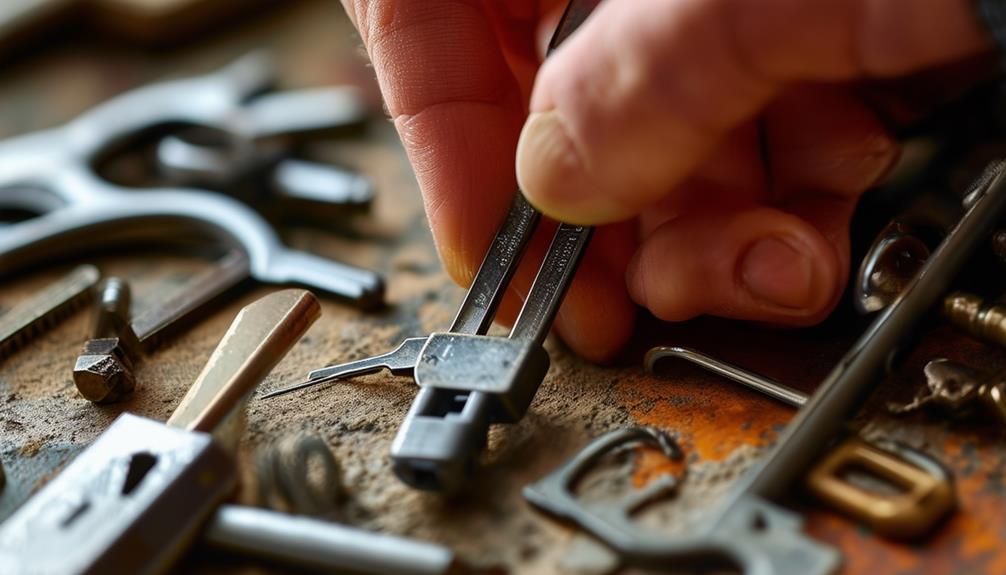
To excel in lock picking competitions, honing your skills in developing speed and precision is vital. When aiming to win lock picking competitions, it's essential to practice techniques that enhance both your speed and accuracy.
Begin by focusing on mastering the basics of lock picking, such as applying the right amount of tension and using proper tools. As you become more proficient, gradually increase your speed while maintaining precision. Incorporating advanced techniques can further elevate your skills, allowing you to tackle more complex locks with ease, as seen in mastering advanced methods.
One effective way to improve your speed and precision is through regular practice sessions. Set aside dedicated time to work on different locks, challenging yourself with varying difficulty levels.
By repeatedly picking locks, you'll develop muscle memory and sharpen your reflexes, allowing you to pick locks quickly and accurately during competitions. Additionally, consider participating in mock competitions or timing yourself to simulate the pressure of a real event.
This will help you build confidence and improve your performance under stress. Remember, consistent practice and a focus on speed and precision are key elements in achieving success in lock picking competitions.
Utilizing Specialized Tools Effectively
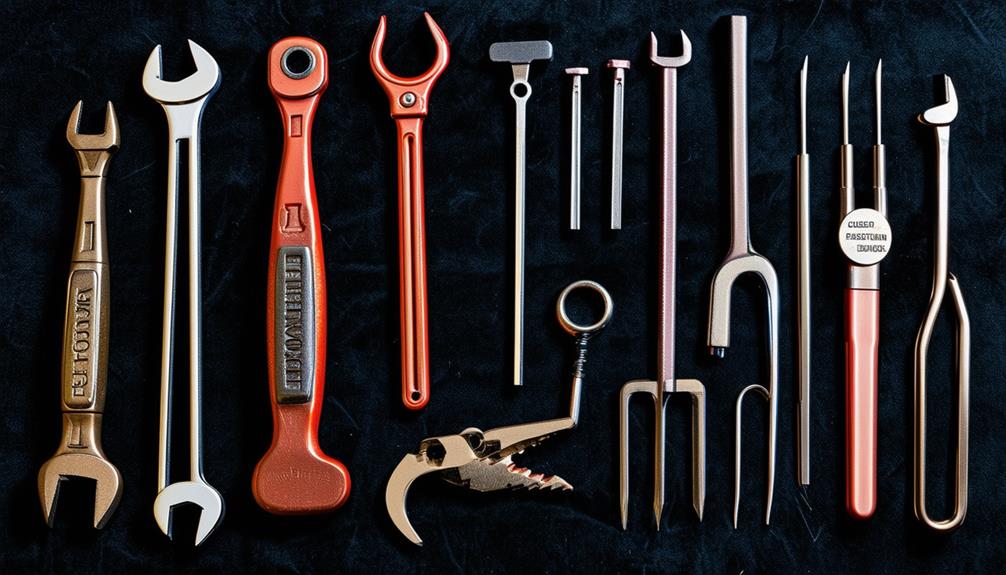
Enhancing your performance in lock picking competitions can be markedly boosted by effectively utilizing specialized tools. When it comes to competition lockpicking, having the right tools can make a significant difference in your success.
Expert lockpicking tips often emphasize the importance of using tools such as tension wrenches, lock picks, and rakes to manipulate the pins inside a lock. Additionally, understanding the nuances of different lock types can further refine your approach, as important tools for lock picking can vary based on the specific challenges presented.
Tension wrenches are vital for applying the necessary pressure to turn the lock cylinder while picking the pins. Make sure to choose a tension wrench that fits comfortably in your hand and provides the right amount of tension.
Lock picks come in various shapes and sizes, each serving a specific purpose. Experiment with different types of lock picks to find the ones that work best for you.
Rakes are useful for quickly manipulating multiple pins at once, allowing for faster entry into the lock. Practice using rakes efficiently to improve your speed and accuracy during competitions.
Practicing Under Pressure

When faced with the intense demands of lock picking competitions, practicing under pressure is essential for honing your skills to peak performance. Competitive lockpicking requires not only technical expertise but also the ability to perform under stress.
To excel in these high-pressure situations, incorporate competition lock picking strategies into your practice routine, such as following the established rules and guidelines that govern these events. Simulate the competition environment by setting time limits, introducing distractions, or having someone observe and critique your technique. This will help you get accustomed to the adrenaline rush and focus better when the stakes are high.
Additionally, practice visualization techniques to mentally prepare for competition scenarios. Visualize yourself successfully maneuvering through a challenging lock, staying calm under pressure, and achieving your desired outcome. This mental rehearsal can boost your confidence and strengthen your ability to perform when it matters most.
Frequently Asked Questions
Are Lock Picking Competitions Legal?
Yes, lock picking competitions are legal in many places.
They're organized events where participants showcase their skills in picking different types of locks. As long as the competition follows local laws and regulations, it's considered a lawful activity.
Competitors often demonstrate their expertise in a controlled environment, emphasizing the technical aspects of lock picking rather than promoting illegal activities.
What Is the Most Challenging Type of Lock to Pick?
When you're honing your lock picking skills, you'll find tubular locks to be quite the challenge.
Their intricate design demands precision and finesse, testing your abilities to their limits.
As you navigate the twists and turns within these locks, you'll need to master a delicate touch and keen attention to detail.
Can Lock Picking Skills Be Used for Illegal Activities?
Absolutely, lock picking skills can be misused for illegal activities.
It's essential to remember that while lock picking can be a valuable skill for locksmiths and security professionals, it can also be exploited by individuals with malicious intent.
It's important to always use your skills ethically and lawfully.
Remember, with great power comes great responsibility.
Always confirm that your lock picking abilities are used for legitimate and legal purposes.
How Do Competitors Prevent Hand Fatigue During Competitions?
To keep your hands nimble during competitions, try stretching them like elastic bands before diving into the challenge.
Remember, relaxation is key. Shake out the tension, and keep a steady rhythm going.
Think of your fingers as dancers gracefully moving across the lock.
Stay hydrated and take short breaks to rest those hard-working hands.
With these tips, you'll be gliding through the competition with ease.
Are There Any Specific Rules or Regulations for Lock Picking Competitions?
In lock picking competitions, specific rules and regulations govern the event.
These guidelines guarantee fair play and maintain the integrity of the competition. Participants must adhere to rules regarding tools, techniques, timing, and locks used in the competition.
Understanding and following these regulations are essential for successful participation and avoiding disqualification.
Be certain to familiarize yourself with the rules to give yourself the best chance at winning.
Conclusion
Now that you've honed your skills and mastered the art of lock picking, you're like a silent shadow in the night, effortlessly maneuvering through the intricate world of locks. With precision and finesse, you've revealed the secrets to success in lock picking competitions. Keep practicing, keep pushing yourself, and soon you'll be the master of any lock that stands in your way. The world of lock picking is now your oyster – go forth and conquer.

